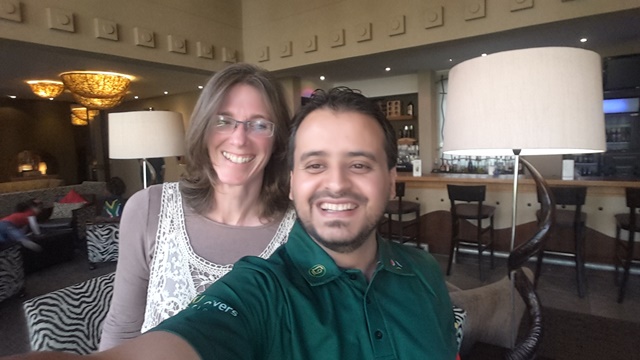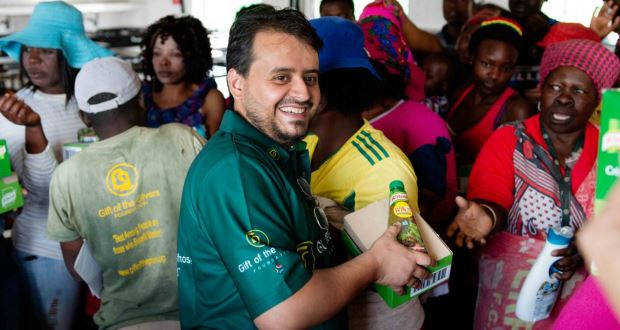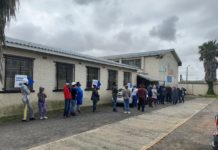In the past six months, over 4,500 Yemenis have been killed and over 80% of Yemen’s population are now in need of humanitarian help. South African NGO Gift of the Givers has been providing food, water and medical supplies to people living in this war-zone. But as the conflict escalates the organisation has removed its Yemeni negotiator, Anas al-Hamati, from the region. FIRDAUS KHAN caught up with him on the conflict, the needs of Yemeni civilians, and how he negotiated with Al-Qaeda for the release of Yolande Korkie.
My story with Gift of the Givers started in 2012 when Dr. Imtiaz Sooliman, Gift of the Givers’ founder, came to Yemen for the first time to see the possibilities of helping. Yemen was facing a hunger crisis at the time. The situation is worse now.
I met him in Sana’a and then took him to Hudaydah province. He decided very quickly to open an office in Yemen, after seeing the situation on the ground. I was, and still am responsible for Gift of the Givers in Yemen. From that time, Gift of the Givers has sent more than 114 containers of supplies to Yemen and implemented more than six water wells. We have a great name in Yemen.
At the moment in Yemen, the situation is very bad. Yemen is under a very strong siege. The Saudi-led coalition fighting in Yemen includes nine Arab states. Thousands of civilians have been killed or injured. There are 25 million Yemenis in urgent need of aid. Ports and airports have been closed; many of them have been destroyed. We only have the Port of Aden in operation, which can’t cover most of Yemen’s needs. The economy is failing. There are only people who fight; there is no other work in Yemen.
RELATED: Part I: The Western world is not the only one ignoring events in Yemen
On the ground now, Gift of the Givers is still very strongly continuing their work. We have our own truck with water tanks to provide water in Hudaydah and Sana’a. We also distribute medical supplies and food to the most affected in the current crisis. We work with orphan kids in Taiz, we cover all their expenses and needs. We also help those inside the prisons, with food and water distribution. With the crisis, there is no water to drink or wash, there is no electricity, no medication, no education, nothing.
It’s difficult to work in Yemen because there are no safe areas. So many people from other NGO’s have been killed through attacks. There is no state to cooperate with. There are no facilities in which to work. You just work in danger, with attacks from the air force and with attacks on the ground. Militants don’t care about who you are and what you’re doing. That’s why we move very slowly and take care of our team on the ground. It’s very dangerous for them, and we must take care of their lives. That’s why we’ve been removed from Hudaydah and Sana’a.
In May 2013, there were two South Africans kidnapped in Yemen. I went to Dr. Sooliman and said, I know that this is likely out of the control of the Yemeni state and I wanted to help. He gave me the go-ahead.
It’s not easy to be involved in these cases, but I just tried to reciprocate what South Africa’s Gift of the Givers do for Yemen, for Syria, for mankind, for anyone else. I learned from them that if you have any opportunity to help anyone, do not hesitate to do that.
We had a good relationship inside Yemen with the tribal leaders, because we have a strong profile. We’ve taken more than 2,000 tons of aid into Yemen, to more than 15,000 families.
I moved to Taiz, where the Korkies were being held, and I started communicating with the kidnappers. Throughout all our projects, I put up pictures of Pierre and Yolande, saying that I want the freedom of this couple. I tried to make a connection with the kidnappers, but we were still searching. At that moment, the ambassador of South Africa was coming to Yemen, and I met with him. He asked me also to make it a priority. I told him it already was.
It took a few months until we found a link that could guide us. When we started negotiating, they said they needed $3million to release the Korkies. I said okay, Yemenis have already received more than this from South Africa through all the projects Gift of the Givers has been doing in Yemen. But these militant groups don’t care about humanitarian work, they just want money to finance their operations.
The negotiations took a few days, but they trusted me because of Gift of the Givers’ strong name in Yemen. I asked them for Yolande for free, and told them we’ll raise money for Pierre. They refused at first, but then they agreed. On 10 January, we took Yolande out of their custody unconditionally.

During the negotiations, we travelled very far out to meet these people. Sometimes they covered their faces, other times, not. Sometimes they take us to places we didn’t know. Sometimes they gave us an appointment and then kept us waiting all day, and then didn’t come. It was not easy to talk to these people, but they knew who I was and slowly, we built trust with them.
So many times, I said to Dr. Sooliman, “If I don’t come home, take care of my family,†because anything is possible. They can shoot you, they can arrest you, anything is possible. But inside me, there was a strong feeling that we should help this couple. It was a great success getting Yolande out and we were very close to getting Pierre out. I don’t think the US was aware that he was going to be released when they tried to save the American journalist, Luke Somers. (Somers and Korkie were killed in the raid.)
It’s difficult for Yemenis to flee the country. Syrians refugees can cross the borders with Turkey and Jordan but Yemen is surrounded by the sea on three sides. Some people try to reach Djibouti and Somalia by boat. On the fourth side we have Saudi Arabia and Oman. We have 20,000 refugees in Somalia now, more than 10,000 in Djibouti, and 1 million in Saudi Arabia. There are so many people trying to move out, but they can’t. There are no ports, no airports, and no transportation outside Yemen. It is very hard, even for those who have money. Most of Yemen is very poor, and there are many people who can’t leave even if they want to.
RELATED: Part II: Why are Muslims not talking about the horror unfolding in Yemen
Journalists can’t move on the ground, and that’s why we have so little light being shed on what’s happening. People are dying because of preventable diseases, because there’s no medication and services to help them.
It would be very easy to stop the war. The UN has ordered Al-Houthi and Saleh just to drop their heavy weapons and leave Sana’a and other main capitals. But they will not stop. They refused to do this. They continue fighting just to take control of new areas and hope to keep the power in one area. Sometimes there’s just a small problem, and you don’t fix it, and it becomes one thing on top of the other – that’s exactly what happened in Yemen.









